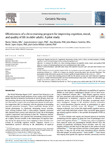Mostrar o rexistro simple do ítem
Effectiveness of a chess-training program for improving cognition, mood, and quality of life in older adults: a pilot study
| dc.contributor.author | Cibeira, Nuria | |
| dc.contributor.author | Lorenzo-López, Laura | |
| dc.contributor.author | Maseda, Ana | |
| dc.contributor.author | Blanco-Fandiño, J. | |
| dc.contributor.author | López-López, Rocío | |
| dc.contributor.author | Millán-Calenti, José Carlos | |
| dc.date.accessioned | 2021-06-29T08:23:46Z | |
| dc.date.available | 2021-06-29T08:23:46Z | |
| dc.date.issued | 2021-06-04 | |
| dc.identifier.citation | Cibeira N, Lorenzo-López L, Maseda A, Blanco-Fandiño J, López-López R, Millán-Calenti JC. Effectiveness of a chess-training program for improving cognition, mood, and quality of life in older adults: a pilot study. Geriatr Nurs. 2021;42(4):894-900. | es_ES |
| dc.identifier.issn | 0197-4572 | |
| dc.identifier.issn | 1528-3984 | |
| dc.identifier.uri | http://hdl.handle.net/2183/28127 | |
| dc.description | Financiado para publicación en acceso aberto: Universidade da Coruña/CISUG | |
| dc.description.abstract | [Abstract] Background. Regular practice of a cognitively stimulating activity, such as chess, can help maintain a healthy cognitive, social, and psychological state during the aging process. Objective. To evaluate the effects of a chess-training program on cognitive status, mood, and quality of life (QoL) in a sample of institutionalized and semi-institutionalized older adults. Method. A nonrandomized, controlled pilot study with repeated measures (pre- and post-intervention) was conducted. Results. Analyses revealed a positive impact of the chess program on general cognitive status (p < 0.001) and promising evidence (p < 0.043) of an impact on attention, processing speed, and executive functions. The participants in the intervention group also showed significant improvement in QoL scores (p < 0.021). Conclusions. A 12-week chess-training protocol with two 60-minute sessions per week improved cognition and QoL in a sample of institutionalized and semi-institutionalized older adults. Further research with larger samples is needed to explore its effects in depth. | es_ES |
| dc.description.sponsorship | Xunta de Galicia; ED431C 2017/49 | es_ES |
| dc.description.sponsorship | Xunta de Galicia; ED431F 2017/09 | es_ES |
| dc.description.sponsorship | This work was supported by Xunta de Galicia (ED431C 2017/49, ED431F 2017/09). Laura Lorenzo-López is supported by the “Ramon y Cajal” Postdoctoral Senior Grant (RYC-2015-18394) from the Spanish Ministry of Economy, Industry, and Competitiveness, co-financed by the European Social Fund. Julia Blanco-Fandiño is supported by a pre-doctoral grant from the Autonomous Government of Galicia (ED481A-2017/219). Funding for open access charge: Universidade da Coruña/CISUG | |
| dc.language.iso | eng | es_ES |
| dc.publisher | Elsevier | es_ES |
| dc.relation | info:eu-repo/grantAgreement/MINECO/Plan Estatal de Investigación Científica y Técnica y de Innovación 2013-2016/RYC-2015-18394/ES | |
| dc.relation.uri | https://doi.org/10.1016/j.gerinurse.2021.04.026 | es_ES |
| dc.rights | Creative Commons Attribution-NonCommercial-NoDerivs 4.0 International License (CC BY-NC-ND 4.0) | es_ES |
| dc.rights.uri | https://creativecommons.org/licenses/by-nc-nd/4.0/ | * |
| dc.subject | Chess | es_ES |
| dc.subject | Cognition | es_ES |
| dc.subject | Mood | es_ES |
| dc.subject | Quality of life | es_ES |
| dc.subject | Nonpharmacological interventions | es_ES |
| dc.subject | Cognitive reserve | es_ES |
| dc.title | Effectiveness of a chess-training program for improving cognition, mood, and quality of life in older adults: a pilot study | es_ES |
| dc.type | info:eu-repo/semantics/article | es_ES |
| dc.rights.access | info:eu-repo/semantics/openAccess | es_ES |
| UDC.journalTitle | Geriatric Nursing | es_ES |
| UDC.volume | 42 | es_ES |
| UDC.issue | 4 | es_ES |
| UDC.startPage | 894 | es_ES |
| UDC.endPage | 900 | es_ES |
Ficheiros no ítem
Este ítem aparece na(s) seguinte(s) colección(s)
-
GI-GIGG - Artigos [113]
-
INIBIC-IX - Artigos [31]






